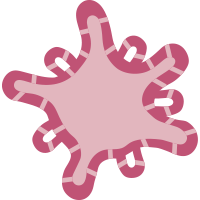
Organoid News
Organoid News is an online resource dedicated to the latest research about and featuring organoids.
Establishment of Human Hematopoietic Organoids for Evaluation of Hematopoietic Injury and Regeneration Effect
[Stem Cell Research & Therapy] To manufacture hematopoietic organoids, researchers obtained CD34+ hematopoietic stem and progenitor cells from human embryonic stem cells using stepwise induction and immunomagnetic bead-sorting.
Heterozygous RB1 Mutation Enhanced ATP Production in Human iPSC-Derived Retinal Organoids
[Molecular Biology Reports] Scientists gained further insight into the molecular disruptions in the RB1+/− retinal organoids, they performed a high throughput RNA sequencing analysis.
Synergistic Hyperactivation of Both mTORC1 and mTORC2 Underlies the Neural Abnormalities of PTEN-Deficient Human Neurons and Cortical Organoids
[Cell Reports] Investigators showed that pluripotent stem cell-derived phosphatase and tensin homolog (PTEN) mutant human neurons, neural precursors, and cortical organoids recapitulated disease-relevant phenotypes, including hypertrophy, electrical hyperactivity, enhanced proliferation, and structural overgrowth.
First Model of the Brain’s Information Highways Developed
[Informationsdienst Wissenschaft] Placenta organoids created from cultured human placenta cells have been used to shed light on several types of infection in early pregnancy
ARID1B Controls Transcriptional Programs of Axon Projection in an Organoid Model of the Human Corpus Callosum
[Cell Stem Cell] Researchers found that neurons expressing SATB2, a determinant of callosal projection neuron (CPN) identity, show impaired maturation in ARID1B+/− neural organoids.
Cerebral Organoids Display Dynamic Clonal Growth and Tunable Tissue Replenishment
[Nature Cell Biology] Investigators implemented whole-tissue lineage tracing by genomic DNA barcoding in 3D human cerebral organoids, to show that individual stem cell clones produced progeny on a vastly variable scale.
High-Fat Diet Enhances Cell Proliferation and Compromises Intestinal Permeability in a Translational Canine Intestinal Organoid Model
[BMC Molecular And Cell Biology] Investigators assessed the multifaceted interactions between palmitic acid, cell proliferation, and the intestinal epithelial barrier using a canine colonoid model. Canine models, due to their relevance in simulating human intestinal diseases, offer a unique platform to explore the molecular mechanisms underlying high-fat diet-derived intestinal dysfunction.
Hyaluronan Improves Photoreceptor Differentiation and Maturation in Human Retinal Organoids
[Acta Biomaterialia] Scientists investigated the addition of hyaluronan, a component of the interphotoreceptor matrix, as an additive to promote long-term organoid survival and enhance retinal maturation.
Sebaceous Gland Organoid Engineering
[Burns & Trauma] The authors provide an overview of recent advancements in sebaceous glands (SG) organoid engineering. It highlights some potential strategies for SG organoid functionalization that were promising to forge a platform for engineering vascularized, innervated, immune-interactive and lipogenic SG organoids.
Quantifying Y Chromosome Loss in Primary and Metastatic Prostate Cancer by Chromosome Painting
Researchers developed a system to quantify Y chromosome gain or loss in patient-derived prostate cancer organoids. Using this system, they observed Y chromosome loss...
Vitamin D Opposes Multilineage Cell Differentiation Induced by Notch Inhibition and BMP4 Pathway Activation in Human Colon Organoids
[Cell Death & Disease] Investigators reported a differentiation system toward enterocytes and goblet cells, the two major colonic epithelial cell lineages, using colon organoids generated from healthy tissue of colorectal cancer patients.
Identification of Genes that Promote PI3K Pathway Activation and Prostate Tumour Formation
[Oncogene] Using prostate organoid models, scientists showed that either Bzw2 downregulation or EIF5A2 overexpression leads to increased organoid size and in vivo prostate growth.
Organoids are three-dimensional cell cultures that more accurately model cell behavior, organ function, and pathology than traditional two-dimensional cell culture. Organoid News was launched in 2020 to help scientists stay up-to-date with this revolutionary new research system. Use Organoid News to stay current with the latest applications and discoveries using organoids, as well as new reviews, jobs, news, and upcoming events.

 Cancer Stem Cell News
Cancer Stem Cell News Cell Therapy News
Cell Therapy News Dermal Cell News
Dermal Cell News Endothelial Cell News
Endothelial Cell News ESC & iPSC News
ESC & iPSC News Extracellular Matrix News
Extracellular Matrix News Hematopoiesis News
Hematopoiesis News Hepatic Cell News
Hepatic Cell News Human Immunology News
Human Immunology News Immune Regulation News
Immune Regulation News
 Intestinal Cell News
Intestinal Cell News Mammary Cell News
Mammary Cell News Mesenchymal Cell News
Mesenchymal Cell News Muscle Cell News
Muscle Cell News Neural Cell News
Neural Cell News Organoid News
Organoid News Pancreatic Cell News
Pancreatic Cell News Prostate Cell News
Prostate Cell News Pulmonary Cell News
Pulmonary Cell News
